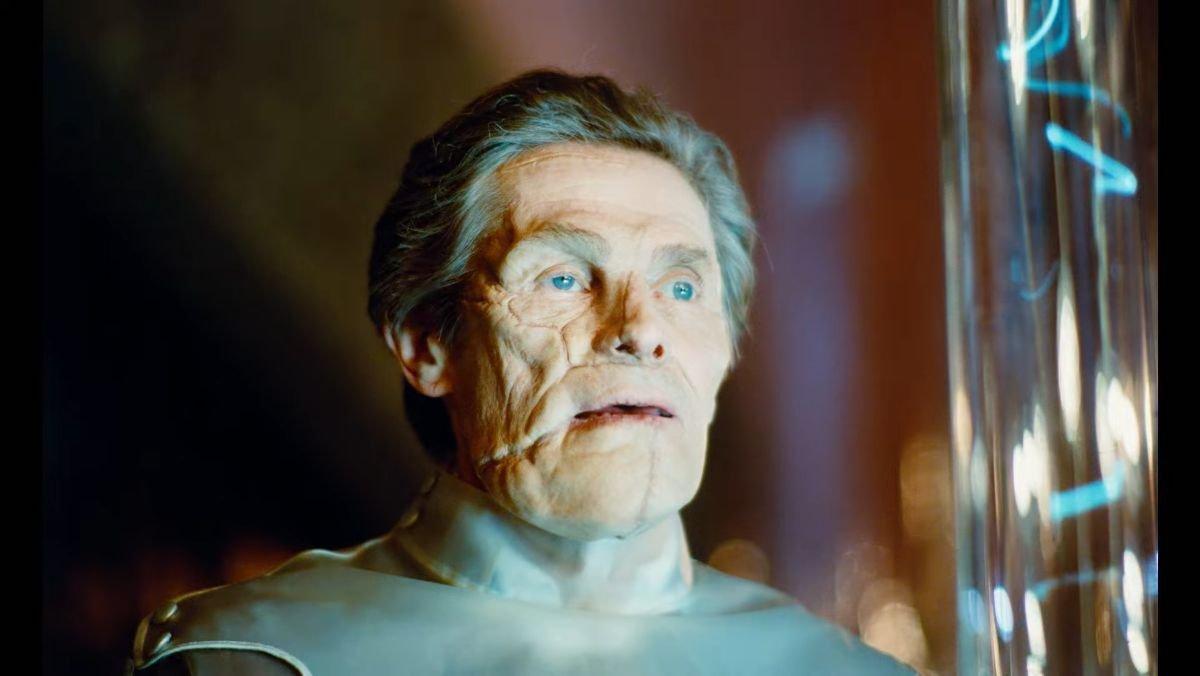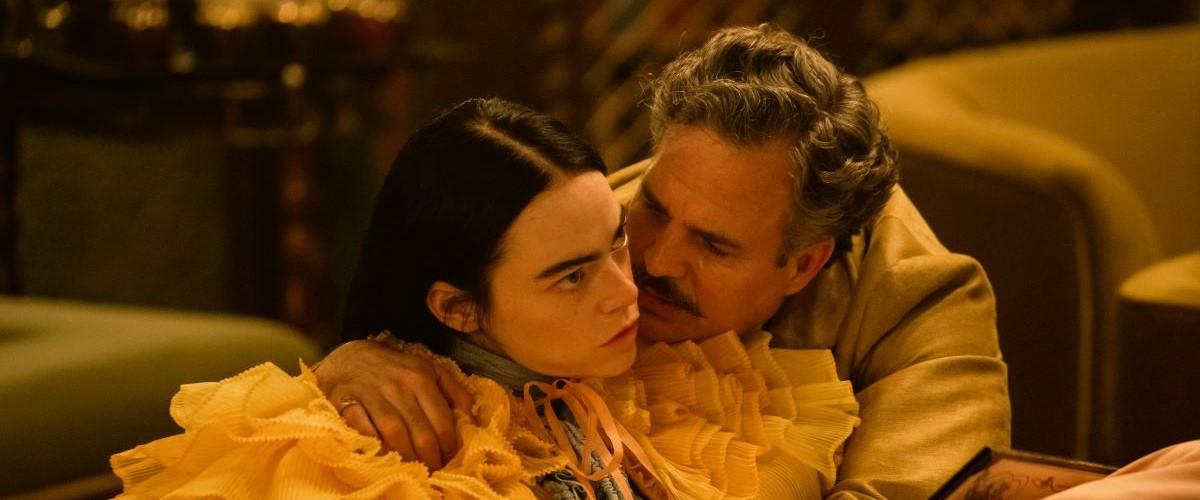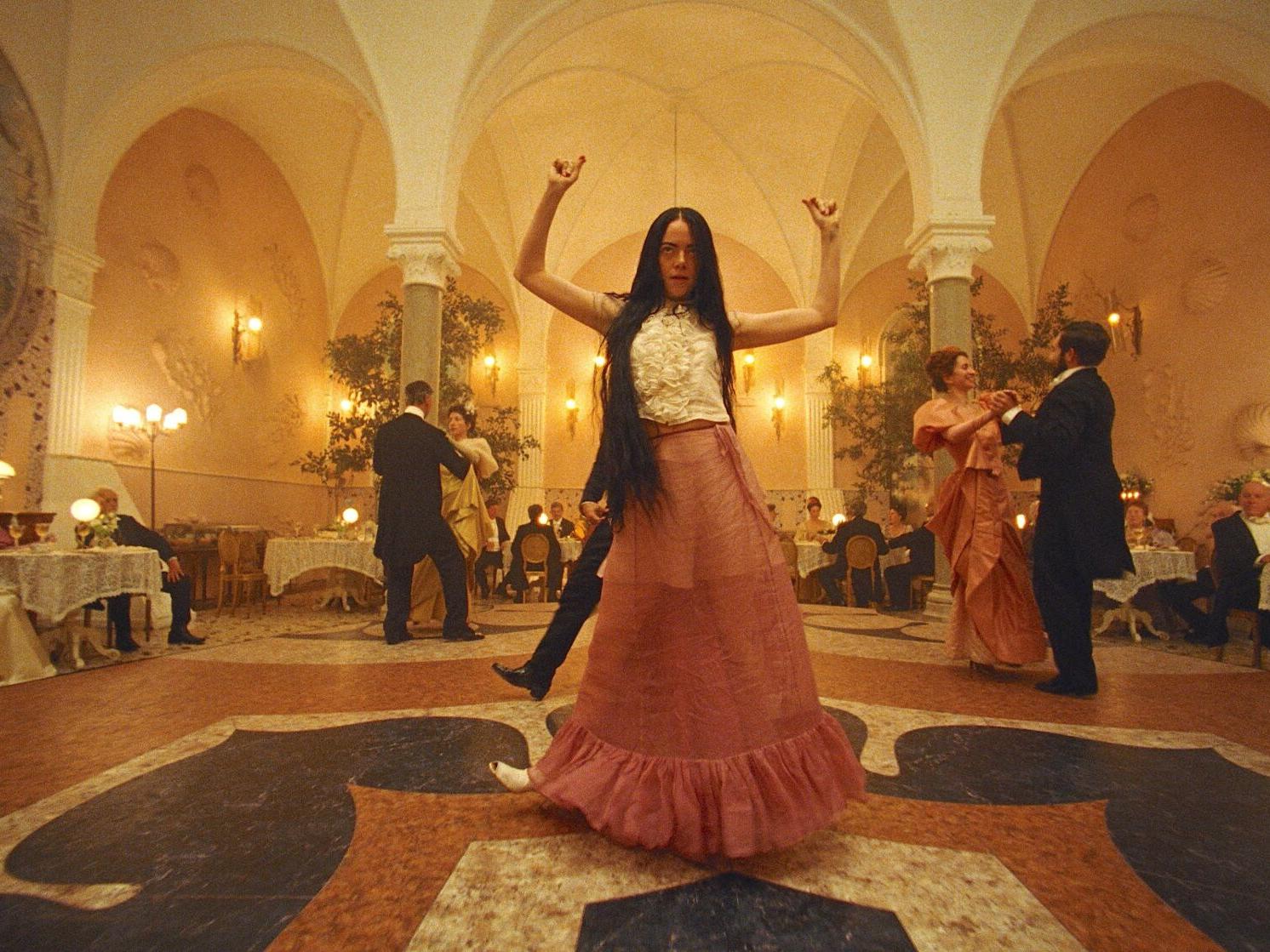Poor Things is a daring exploration of what it means to be alive. It is as funny as it is shocking, as beautiful as it is grotesque. With incredible performances and production, it never fails to surprise you in one way or another.
Growing up is hard enough, but imagine if you had to do it with the brain of an infant. This is the premise of Greek filmmaker Yorgos Lanthimos’ latest film, Poor Things. The main character commits suicide in the very first scene, but is brought back to life by a mad scientist named God(win) Baxter who replaces her damaged brain with that of her infant child. The film is based on the novel of the same name by Alasdair Grey.
Poor Things
Directed By: Yorgos Lanthimos
Written By: Tony McNamara
Starring: Emma Stone, Mark Ruffalo, Willem Dafoe, Ramy Youssef
Release Date: December 8, 2023
The infant-reborn-as-woman is Bella, who stumbles around in the early part of the film trying to make sense of her surroundings and condition. Her naive mind grows quickly, trying to catch up with her experienced body. It is a disjointing experience as we witness a child grappling with the difficulties of youth coming at them rapid-fire. As she grows up, she becomes more curious of the world around her, and eventually leaves the safety of her home to explore the world and its many many dangers.
While the basic premise of the film (young person having insatiable curiosity of the world-at-large) seems played out, I assure you everything else is anything but. Full of bombastic performances, incredibly unique production, and cast in soft dreamlike colors, Poor Things is as intriguing to witness as Bella’s excitement for exploration. The film unfolds like a kooky fairy-tale, unafraid to go places that coming-of-age movies wouldn’t dream of going. The result is not wholesome entertainment; it can be downright shocking at times. Yet portrayed as a playful gothic comedy, there is enough of an endearing thread to keep you from drowning.

It takes a Frankenstein-like approach not just to the physical assembly of its main character, but also the adventure she follows and the presentation of the film itself. It is a fascinating combination of different ideas, approaches and themes to fashion something that is never NOT interesting. The look is steampunk chic, like a colorful art nouveau fever dream. It uses old-school mirror projection tricks, and animation and set design that bring to mind Monty Python. Director Lanthimos uses fish-eye lenses to keep everything on edge, and claustrophobic sets have dizzying spiral stairs and balconies leading to mysterious unknown destinations and vistas.
Bella is brought to life on screen with an incredible fire (and gusto) by Emma Stone. It is a very daring and risqué performance that rewards the film’s tendency to put her under a microscope. Indeed the film goes all in, but it pays off thanks to the way Stone conveys Bella’s wide-eyed inquisitiveness with the audience. When the film feels like it goes too far, that is only because it is our own experience that leads to hesitation. Stone essentially takes our hand and guides us through that fear to realize what’s on the other side.
In addition to the powerhouse performance by Stone, Poor Things features other remarkable performances. Mark Ruffalo portrays a lawyer who tries to take advantage of Bella and eventually does. Ruffalo counters his typically mild-mannered performances with one that goes off the rails. His character is unhinged, and brings the sort of emotional desperation that Bella doesn’t have with her more scientific approach to the experiences of youth. Ruffalo manages to create the exact type of person you would warn your teenage daughter about, and despite being so off putting in theory the audience can’t get enough of his wild schemes and child-like outbursts.

The great Willem Dafoe portrays Bella’s creator/father figure Godwin, who is literally “missing parts”. His father abused young Godwin as his own personal cadaver for medical experiments. This traumatic childhood leaves him lacking in terms of human connection, and causes him to become an outcast despite his formidable medical knowledge. But on the other hand, he has experienced so much pain that he has incredible resiliency. He is representative of the film’s central idea of how true understanding often comes through the experience of struggle. Dafoe gives Godwin an intimidating facade, yet his father-like feelings towards Bella soften him over time.
Ramy Youssef portrays an assistant (Max) who Godwin brings to his lab to document Bella, but eventually falls in love with her. He feels like the only normal person in the film, and serves as a level head in a world of extremes – yet that position is not an easy one to be in. He comes to work for Godwin because he is an admirer of his work. But experiences both genuine horror and pity for Bella, especially as he finds out her true origins which had been kept secret. This forces Max to choose between being loyal to Godwin or Bella. Similarly, he realizes that he must let her go out into the world in order for her to grow into who she is meant to be, even if that puts her in considerable danger.
In more than one way the film flips the script on its original premise. Bella leaves her home in London initially intoxicated by the lure of adventure and unfulfilled potential. Yet after experiencing the highs and lows of the world, she realizes her place is back where she started. Likewise, Bella was initially the naive child in a grown woman’s body completely dependent on the adult men in her life. Yet through the course of the film the roles flip and those same men come to act out like children themselves.

Through many trials the film puts its female protagonist through the wringer. Bella is objectivized and obsessed over by men who are motivated by their own selfish desires. They attempt to control her and tell her who she should be and how she should behave, according to what they want. There are times she loses hope and makes harmful mistakes. But through it all she grows and comes to realize her place in the world and where she wants to be, rather than what others want her to be. The film can be cruel and sadistic, but there’s a method to the madness.
In addition to the gonzo style and powerhouse performances, what stands out the most about Poor Things is how supportive of its main character it can be in her frantic search for emotional satisfaction. It exudes a more modern and empowering approach to the nature vs. nurture themes we have seen in countless films before. This makes Poor Things incredibly inventive and daring in everything it does except one very important aspect. Thus, as long as you don’t mind being told something you already know, you’re free to enjoy this wild and crazy ride.

